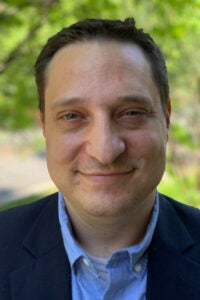
Bradley Gelfand, PhD
Bradley Gelfand, PhD, an assistant professor in the Department of Ophthalmology, was awarded a $2.6 million grant for a study titled “Mechanistic basis of sexual dimorphism in antigen-independent IgG1 angiogenesis regulation.”
Excess or insufficient blood vessel growth is a key component of many complex diseases. For example, whereas peripheral artery disease is caused by an insufficient supply of blood vessels, diseases like wet macular degeneration are caused by excessive growth of blood vessels. This project was originally inspired by an NIH administrative supplement to study sex-specific differences in the effect of IgG1 antibodies on the growth of blood vessels. Dr. Gelfand and his team found that male models and male-derived cells exhibited more potent anti-angiogenic responses to IgG1 class antibodies. This proposal seeks to understand the root causes of these sex-specific differences. By deciphering the mechanisms underlying these sex differences in antibody responses, the hope is to provide better and more personalized therapeutic approaches to control the growth of blood vessels.
Learn more about Dr. Gelfand’s research.
